

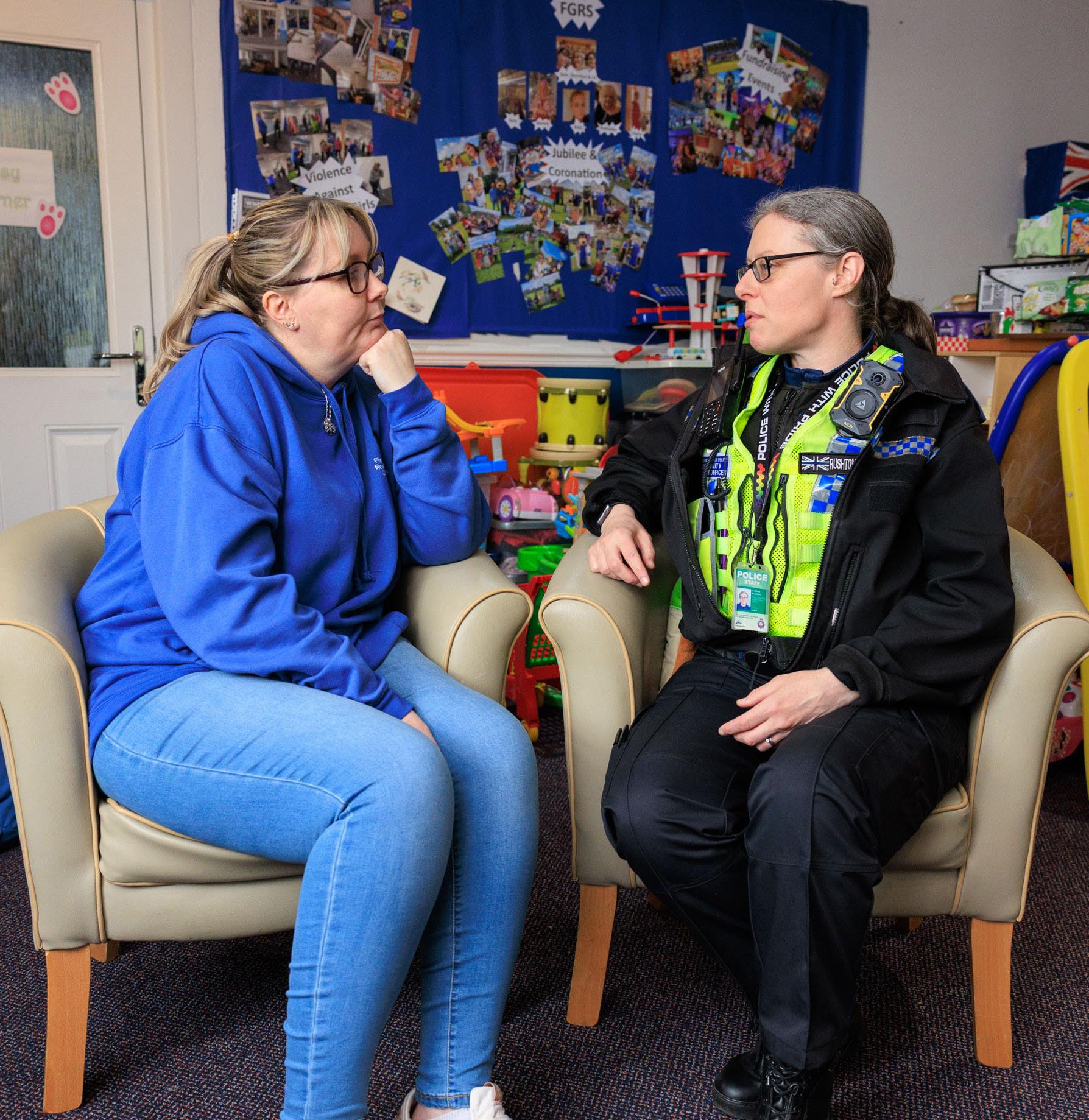




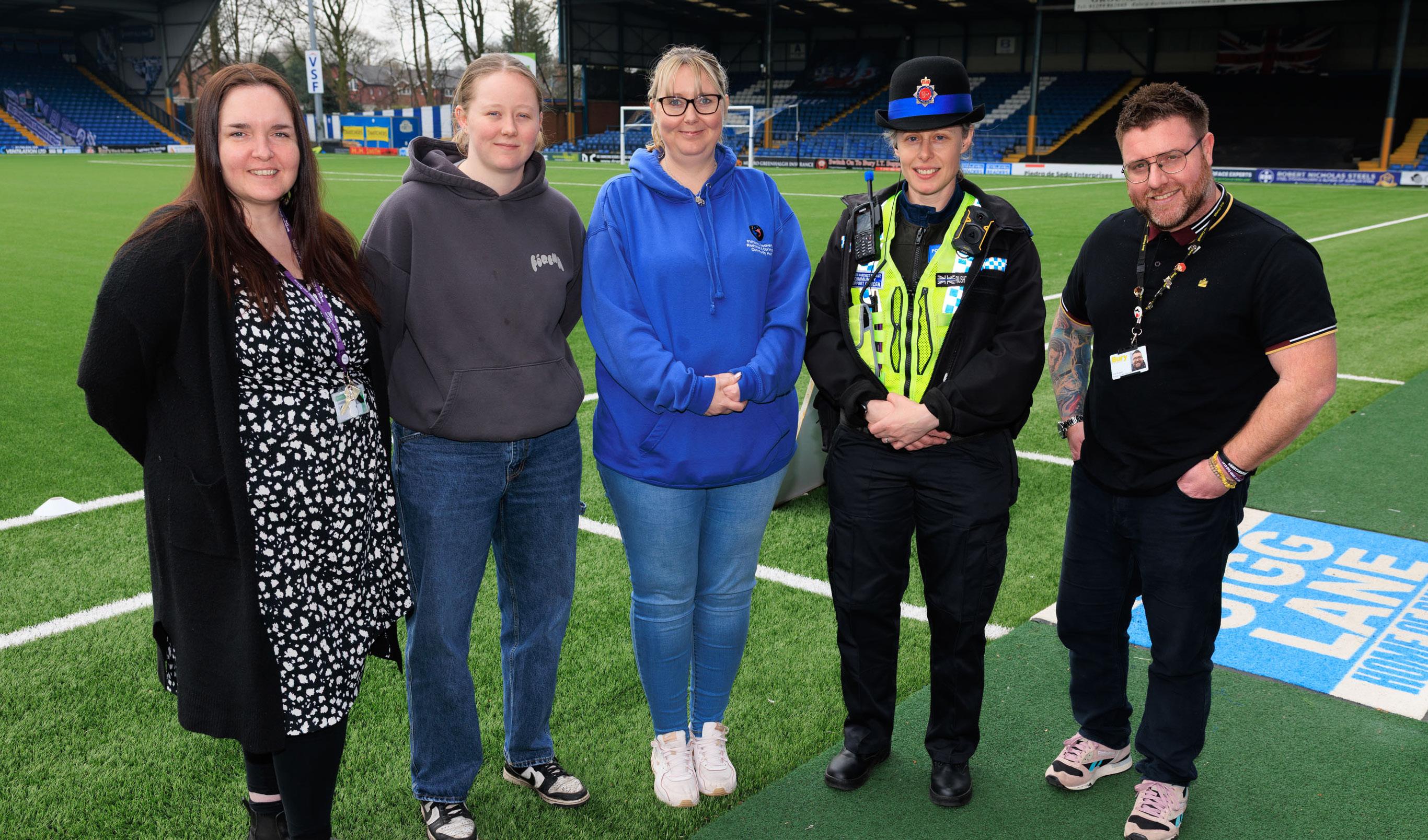
information can be found on pages 2, 11 and 12. Force information is pages 3 - 10.
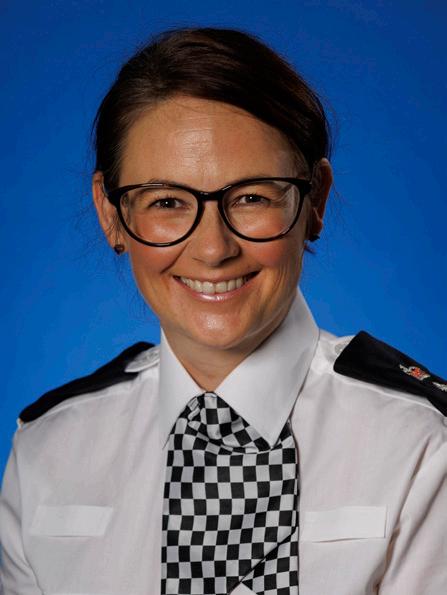
Yet again, another busy month for Bury.
Thank you for all for your commitment to policing our communities as we are heading into the summer months.
This month I had the absolute privilege of holding my first Chief Superintendent Awards. This was held at Bury police station on Thursday 3 April 2025. Whilst I was reading out the awards I was amazed at all the bravery I read about and all the genuine hard work where people have gone above and beyond. The amount of lives saved through those awards alone is testament to why the police deserve trust and confidence from the public.
I am now looking forward to hosting the Best of Bury Awards on Friday 9 May at Bury Football Club. Any good work you feel worthy please submit a nomination. The panel will be reviewing them in week commencing 21 April so there is still time to submit nominations.
I hope some of you are attending and looking forward to the Chief Constable Roadshows. These roadshows are a real insight to the Chief’s vision for GMP and if you haven’t booked on and wish to attend then I urge you to do so.
Thank you
District Commander Kirsty Oliver
Building strong, positive relationships between police and communities is key to keeping people safe, building relationships and trust.
One of the ways neighbourhood officers in Bury have been doing this is through an established community hub based at Bury football club that has made a significant impact since it was set up in August 2021.
The hub, which is currently open Monday to Friday, operates as a community café, food and clothing bank. It also runs several classes throughout the week including a support group for residents over 75 and parent and toddler sessions.
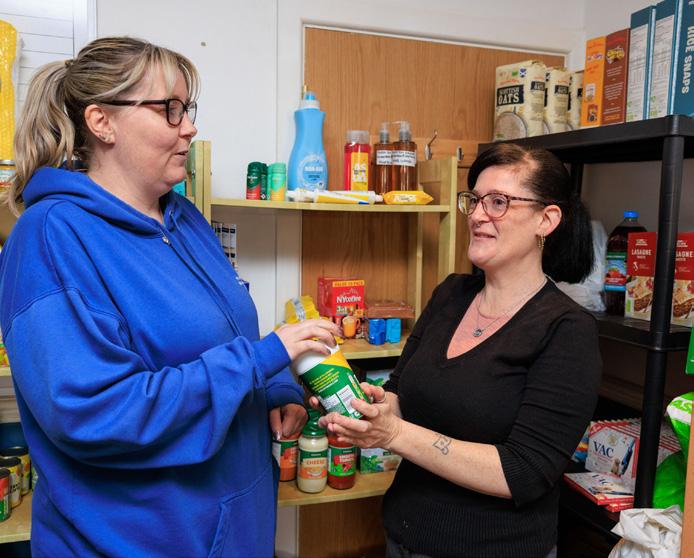
Additionally, it offers kids boxing classes aimed at keeping young people off the streets and guiding them away from negative influences, as well as supporting them with school supplies, having provided over 1,000 kids with primary and secondary school uniform.
Since its inception three years ago, the hub has become a cornerstone of the community. Every Friday morning, PCSO Colette Rushton has been attending the hub to support residents and those that volunteer at the hub. The presence of PCSO Rushton at the hub, rather than at a station, has made it a more welcoming and comfortable environment for residents.
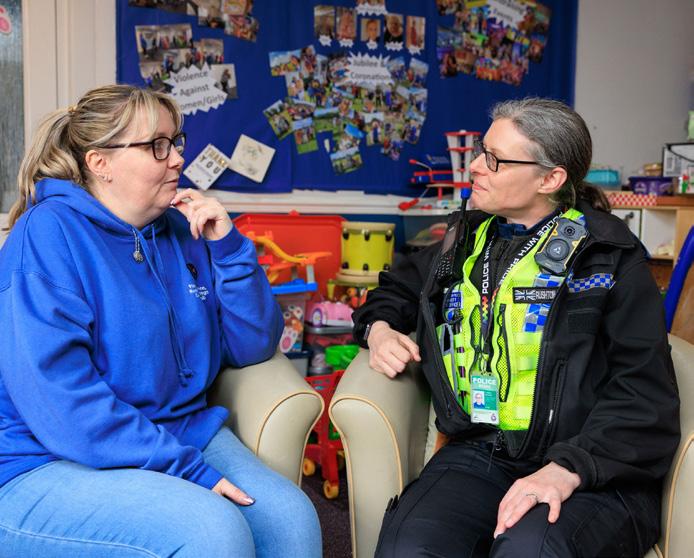
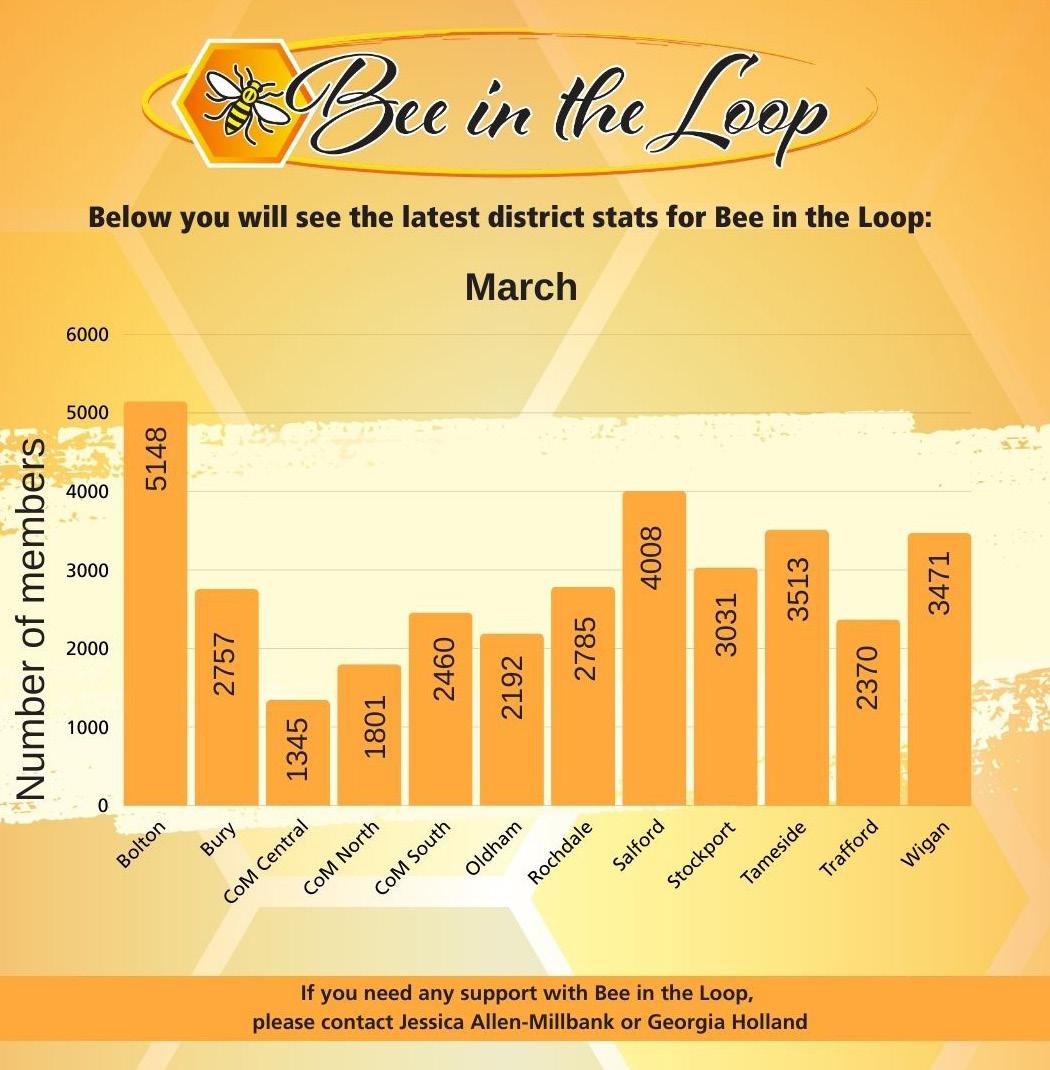
It’s not too late to book a place at the Chief Constable’s annual roadshow, where the force joins together to celebrate our achievements over the past year and discuss how we want to progress in the future.
You can book your place and let us know any questions you have for the Chief Officer team at https://forms.office.com/e/ vZT3qqMhe9. As the Brief goes to print, spaces are still available at the following sessions:
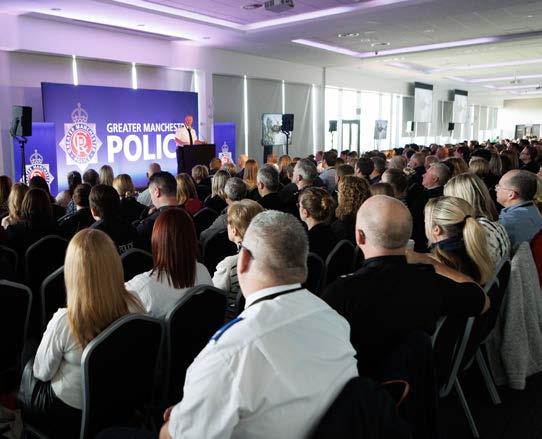
• Tuesday 6 May, Queen Elizabeth Hall, Oldham – 1:30pm to 3:30pm
• Monday 12 May, Concorde hangar, Manchester Airport –1:30pm to 3:30pm
You can book your own place, book a place for someone else or make a block booking for a group – please make sure you have your line manager’s approval to attend.
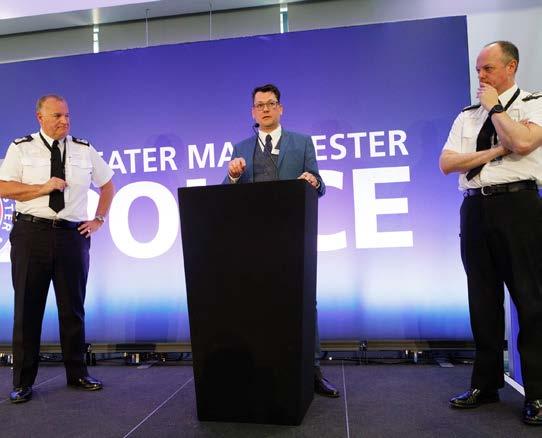
The College of Policing has launched a suite of seven digital Code of Ethics (CoE) training modules, which all police officers and staff should complete before October.
The digital modules are designed to reinforce the new Code of Ethics, launched in 2024, which introduced the three new principles of courage; respect and empathy; and public service. They can be accessed through the College Learn website at https://www. learn.college.police.uk/CL/Content/ Summary/50540. Each module should take no longer than 10 to 15 minutes to complete; ideally, you should aim to complete around one module a month.
The first two modules are as follows:
Module 1 is an introduction to ethical policing. In this single-page module, NPCC Lead for Ethics DCC Sam
de Reya, of Hampshire and Isle of Wight Constabulary, explains why ethical policing matters. She explains the reasons for the 2023 Code of Ethics and describes the new ethical framework, comprising the Code of Ethics, consisting of ethical policing principles and guidance on ethical and professional behaviour; and supported by the Code of Practice for ethical policing. This module also identifies some of the main barriers to behaving ethically.
Module 2 covers ethical decision making and includes a worked example. Learners are encouraged to consider what questions they could ask themselves to help them make good ethical decisions. A different ethical policing scenario is used to give learners the opportunity to reflect on possible decisions or actions they could take, and
the considerations and rationale for each of these decisions.
Please aim to complete the above two modules by the end of April. For more information on the CoE, you can visit College Learn by scanning the QR code on this page or contact helen.walsh@ gmp.police.uk with any questions you may have.


On Monday 24 March, GMP officers and staff in senior and managerial roles attended a conference on sexual misconduct in policing, including sexual harassment and abuse of position for a sexual purpose (APSP).
Chief Constable Stephen Watson QPM opened the event, saying: “GMP is a resurgent organisation, and this is a testament to the work you and your colleagues are doing…you have the moral imperative and the power to stand up and look after people.”
Keynote speaker Dr Fay Sweeting, lecturer in forensic psychology at Bournemouth University, presented case studies of APSP – a relatively rare but particularly insidious form of police corruption – and outlined the key risk factors and cultural contributors for internal sexual misconduct within policing.
City of Manchester Supt Nicola Williams delivered a presentation on her implementation of women’s listening circles to raise consciousness and combat misogyny across the district. The listening circles, which Supt Williams first implemented not long after arriving on the district in 2023, have been well received by participants and have provided essential feedback for the
Professional Standards Division (PSD) and Deputy Chief Constable Terry Woods, among others.
Attendees were shown a short video titled Voice of the Victim, in which a woman who was subjected to APSP by a GMP officer after reporting domestic abuse speaks movingly about her experiences. The event closed with presentations from Det Supts Simon Hurst, of GMP’s Anti-Corruption Unit (ACU), and Carl Gilbert of PSD, outlining the role of their respective departments in preventing and addressing sexual misconduct within GMP, and acting swiftly and effectively in response to complaints.
Following the event, PSD received a number of messages of thanks from
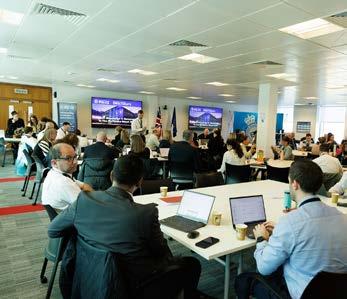
colleagues, external partners, and Leanne, the subject of the Voice of the Victim video. She said: “I am really grateful for the opportunity to tell my story, and for it to be a learning exercise within the police force. I held a lot of guilt for a very long time, I see now it was not my fault. What is being done with in the force, seeing and being a part of the change has allowed me to overcome that guilt and see I wasn’t to blame for what he did.
“I’d like to thank yourself and everyone else who took the time to listen and make it happen, while also making positive steps to the changes that are being made. The force is definitely making such progress in stamping out this behaviour and I feel that should be acknowledged.”
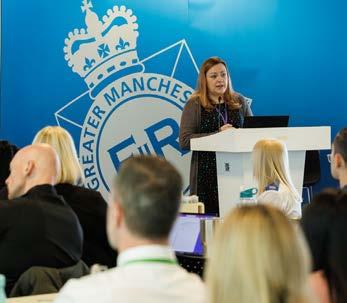
On Friday 7 March, officers and staff from across GMP attended a daylong event at force headquarters celebrating International Women’s Day, which takes place every year on 8 March.
The event, organised by DC Olivia Main and other members of GMP’s Association of Women in Policing (AWP), aimed to recognise and commemorate the contributions of female police officers and staff not only to GMP, but to policing as a whole. Opening the event, ACC Steph Parker – the highest-ranking woman in GMP – opened the event with a speech highlighting the need for female officers and staff to support and elevate each other, saying: “Each one of us has the power to inspire and effect change, both in our own roles and in the communities we serve.”
Dr Sajjan Gohel, international security director at the Asia-Pacific Foundation and visiting lecturer at the London School of Economics and Political Science, delivered a powerful presentation on the theme ‘Misogyny: the antechamber to terror and repression’, and chair of the Police History Society and former senior Metropolitan Police officer Kate Halpin QPM gave an entertaining and inspiring lecture on the

history of women in policing.
The afternoon began with a lecture from Ruth O’Malley, head of data science at Counter-Terror Policing, on the integral role of police staff in complex investigations; followed by a presentation on professional development as a key factor in leadership, given by GMP leadership trainer Rebekah Renshaw.
Thank you to Olivia and the AWP for arranging the event!
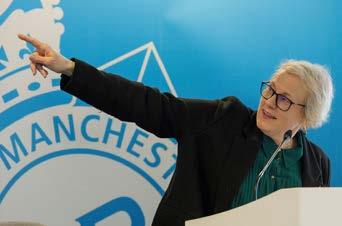
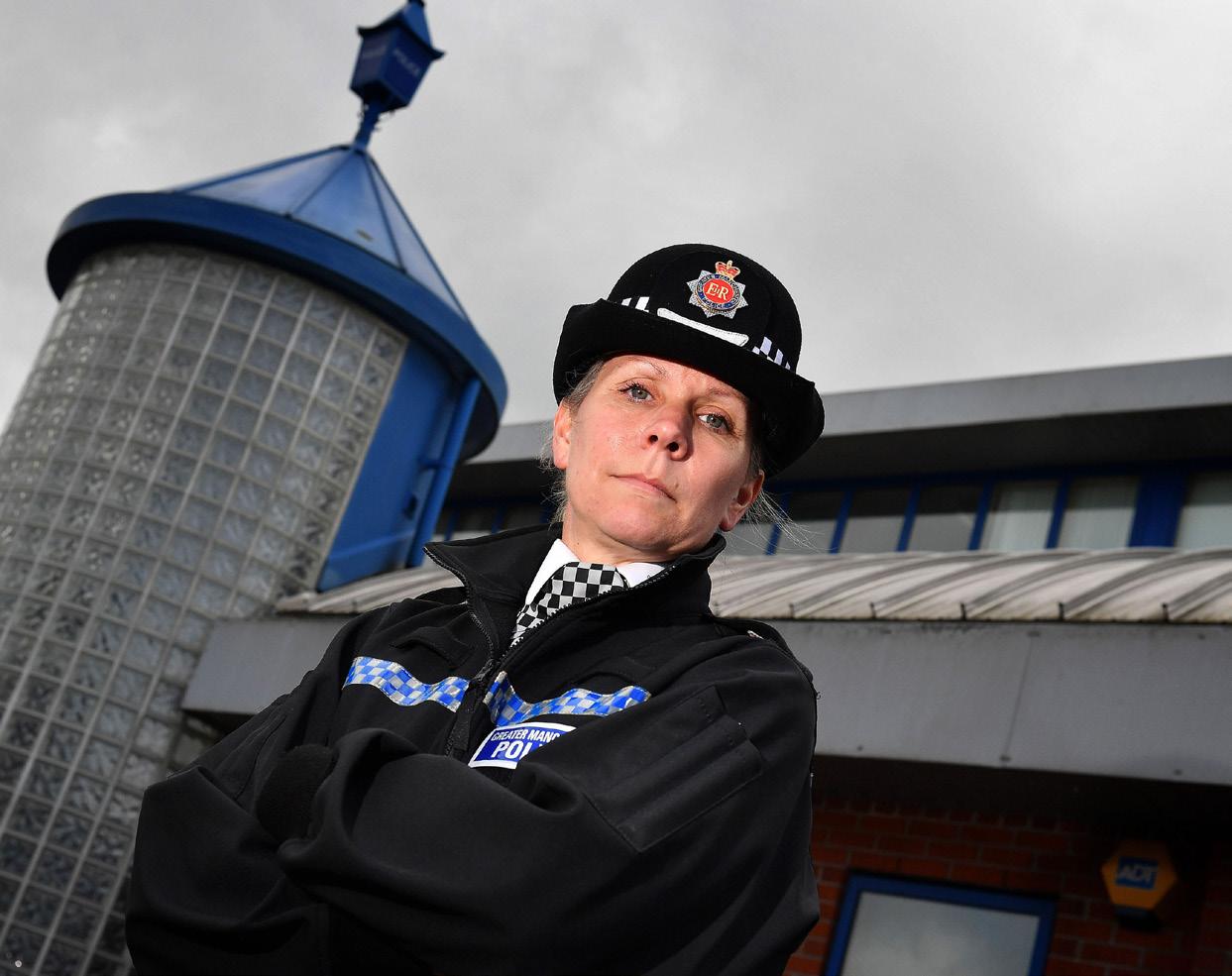
for protecting vulnerable people, which includes some ‘very harrowing and challenging’ cases, but ACC Parker values the difference we are able to make to the lives of people in our communities, which ‘makes it all worthwhile’.
She commented: “I see it as my duty to bring these issues to the forefront of policing – and to ensure that our frontline officers are fully trained and equipped to understand the complexities of dealing with vulnerable people with compassion and expertise.
“Over the course of the past 25 years, I have witnessed the role of women in the police grow and evolve. From the barriers female officers faced historically, there are now absolutely no limits on what women can achieve in the police, both in terms of rank and specialist roles. Along with many of my female colleagues, I am proud to have worked tirelessly to ensure that women in the policing family have as many opportunities in their careers as possible.”
university, she volunteered as a special constable to see what policing was really like – and found that she loved it.
ACC Parker said: “As soon as I got my degree, I successfully applied to join GMP. I was 21 when I joined and I’ve been here for 25 years.
“I started work as a response officer at Astley Bridge in Bolton. I moved into the Child Protection Investigation Unit (CPIU) in 2003 and I was promoted to sergeant in CPIU in 2010. I was then promoted to detective inspector and stayed in the City of Manchester North division for three years, managing the Public Protection Investigation Unit. I moved back to Bolton as a detective inspector in CID in 2019.”
Before being promoted to Assistant Chief Constable in September 2024, ACC Parker was chief superintendent and district commander for Bolton. She now holds the portfolio
The work of policing can present some unique challenges, and the occupation has not always been entirely welcoming to women, both in terms of practical considerations – for example, the impact of shift work on family life – and the social and political barriers commonly faced by women in traditionally maledriven fields.
ACC Parker said: “I think policing has come a very long way in the last few years, with mentoring, workplace flexibility and networking opportunities. Of course there is still work to be done, but with so many women in leadership positions, there has never been a better time to ensure that policing is held as a benchmark of true gender equality.
“I think that all leaders in policing will have their own unique style of leadership, irrespective of gender. The ability to communicate openly and candidly being a woman can definitely bring different experience to the role, but I do recognise the importance of being the most senior female police officer in GMP, and the example that I can set for future generations of female leaders.”
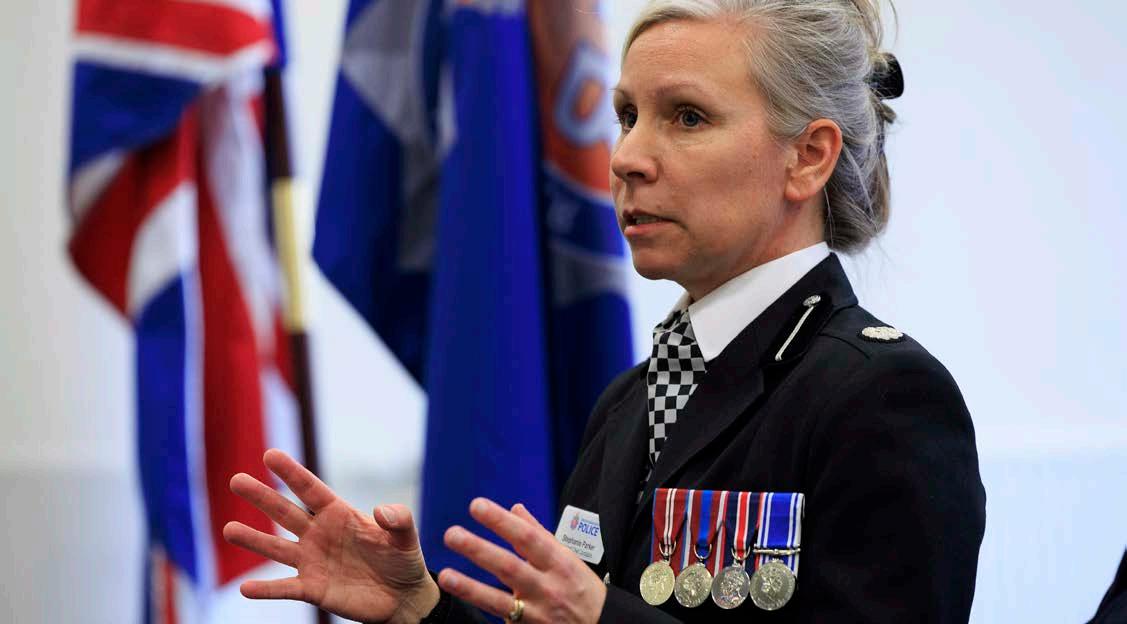
Greater Manchester Police is committed to dealing professionally with the management of evidence, to safeguard its integrity in support of the prevention, reduction and detection of crime; keeping people safe; and caring for victims. By providing an effective evidential management handling system, we are able to ensure that evidence is secured appropriately, correctly identified and its movement tracked, while treating religious and cultural items with appropriate sensitivity and accountability.
Our officers play a key role in this by ensuring all evidential property items in our possession are updated promptly and either retained, returned to owner, or destroyed. You should manage evidential property through the evidential property management system (ePMS), updating records when they are showing green and not waiting till they turn amber. Supervisors play a key role in managing colleagues’ workloads, and must act when items are showing amber on the dashboard.
Supervisors are reminded that if an officer is leaving, they must review all outstanding items during their leaving interview with the officer and update the ePMS showing the collar number of the new officer in charge, to ensure correct management of the evidence. Officers are encouraged to log onto
the ePMS once a set to manage their tasks, to prevent them becoming unmanageable.
You can learn more about how to package and store specific types of evidence on the Forensic Services intranet page via Home > Branches > Forensic Services.
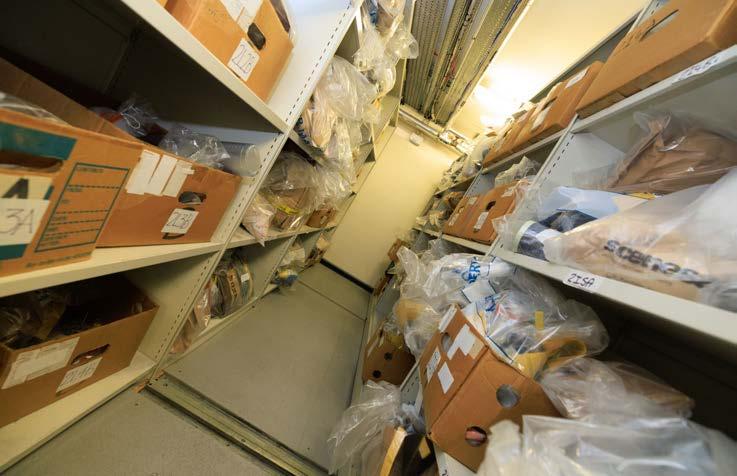
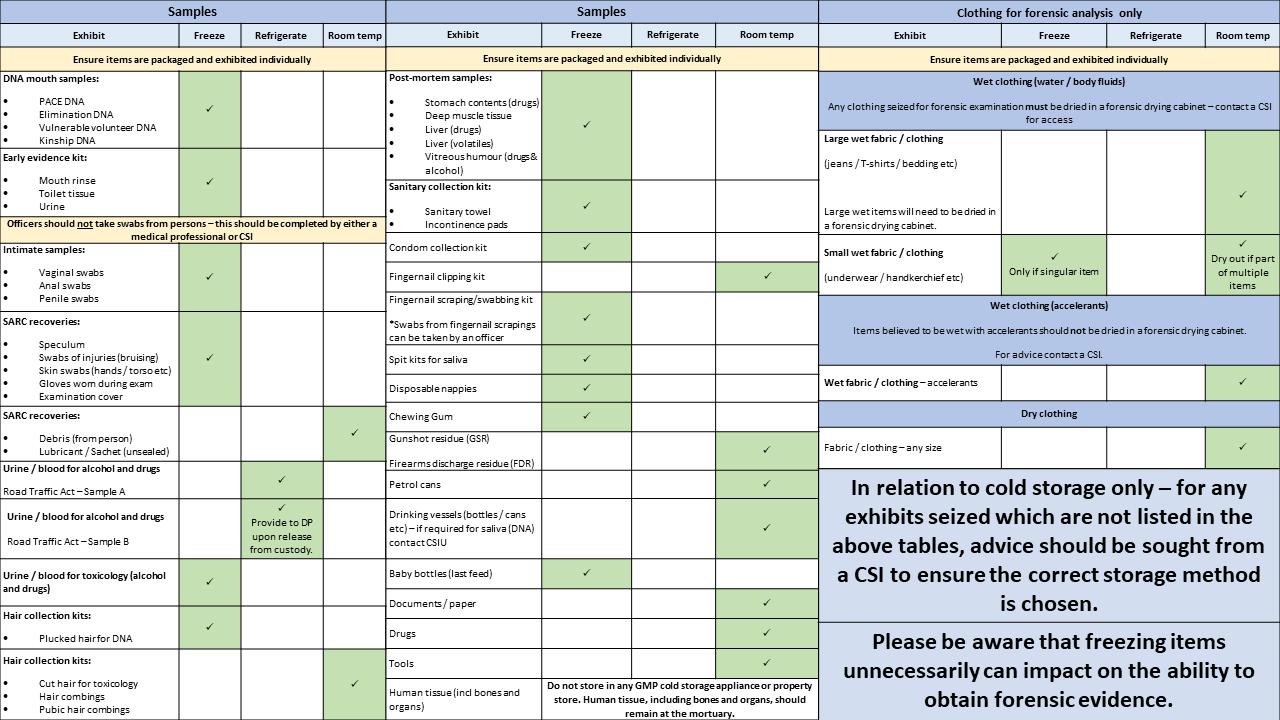
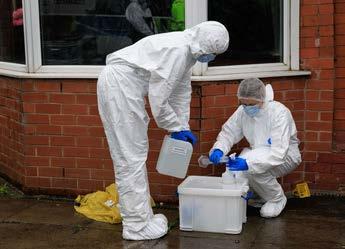
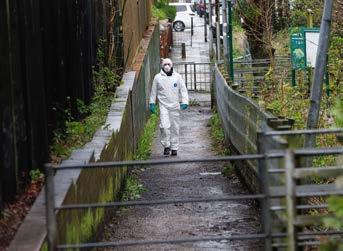
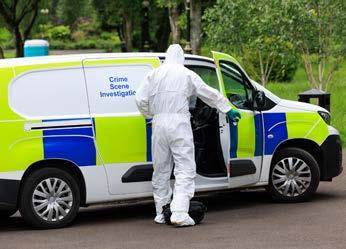
When a member of the public found human remains in Kersal Dale, Salford on 4 April 2024, GMP launched a murder investigation which would draw on four months of searches in 19 individual locations; 2,000 hours of CCTV footage; 3,000 evidential exhibits; and more than 450 witness statements. Kersal Dale itself remained a search scene for 12 days.
On Thursday 18 April 2024, exactly two weeks after the initial discovery, members of GMP’s Visual Evidence Retrieval and Analysis (VERA) unit who had been scouring CCTV footage from around the area identified ‘heavy bag man’: a man on foot struggling to carry a large, evidently heavy bag along Bury New Road in Prestwich. A week later, on the morning of Thursday 25 April, VERA officers spotted ‘heavy bag man’ on Eccles Old Road and called for backup, resulting in Specialist Operations officers arresting the man, Marcin Majerkiewicz, on suspicion of murder.
After establishing that Majerkiewicz’s housemate, Stuart Everett, had not been seen for some weeks, the team conducted forensic DNA testing and declared that the remains which had been found were Stuart’s. The team further established that Stuart had not been reported missing by his family because they are not local to Greater Manchester – and because, for around three weeks following the murder, Majerkiewicz had assumed Stuart’s identity to send his family WhatsApp messages, birthday cards and gifts. A comprehensive forensic investigation of the house where the two men lived revealed bloodstains, tool marks and extensive evidence indicating attempts at a deep clean.
Local uniformed officers dedicated hundreds of hours to protect the integrity of each crime scene and provide support to local communities; while members of the Tactical Aid Unit, North West Underwater Search Unit and Police
Search Advisors (POLSAs) expertly and strategically searched the area, and crime scene investigators were brought in to recover and capture evidence.
Det Ch Supt Lewis Hughes, senior investigating officer in the case, said: “The tenacity and professionalism of all officers involved has been exemplary and they are a credit to the communities of Greater Manchester which they serve. Hundreds of officers from across the force, including Specialist Operations, CSI, detectives and police staff were all motivated to ensure the abhorrent actions of Marcin Majerkiewicz did not go unpunished.”
On Friday 21 March 2025, a jury at Manchester Crown Court unanimously found Marcin Majerkiewicz guilty of the murder of Stuart Everett. On Friday 28 March, he was sentenced to life imprisonment with a minimum sentence of 34 years.
In his sentencing, Mr Justice Cavanagh praised officers and units from GMP for their ‘truly outstanding police work’, saying: “The police officers, investigators, and forensic scientists who played their part are to be commended for their exceptionally hard work, and for the extremely professional and skilful way in which they carried out their duties.
“The officers and investigators from Greater Manchester Police whom the Court would like publicly to commend in particular for their excellent work are the following:
• Det Ch Supt Lewis Hughes, the senior investigating officer, senior identification manager and strategic investigator in overall charge of this investigation
• DS Susannah Holt, the officer in the case
• DC Anouska Barker, who was in charge of disclosure
• DC Adam Smith, who led on telephony and digital evidence
• Investigation support officer (ISO)
Stuart Hynes, from the Greater
Manchester Police Visual Evidence Review and Analysis Unit (VERA), who was heavily involved in the trawl for, review and recovery of CCTV evidence
• ISO Courtney Greenhough, responsible for the management of exhibits
• Ms Faye Jones, analyst
• DCs Sharon Manning and Rhian Toland, the family liaison officers
• The following members of the VERA Unit who took part in the retrieval and examination of CCTV evidence: DS Heidi Cullum, and ISOs Toby Coshall, Zoe Clough, Clare Daly, and Matthew Ross
• Emma Wright, crime scene manager
• Natalie Entwistle, crime scene investigator
• Lynsey Leach, forensic submissions manager
• ISOs Ryan Bellis and Dale Walker from the Digital Investigation Unit
• Sgt Joseph Doyle, lead police search adviser
• Insp Isobel Hunt, underwater search lead
• DS Danielle Bullivant, responsible for search management”
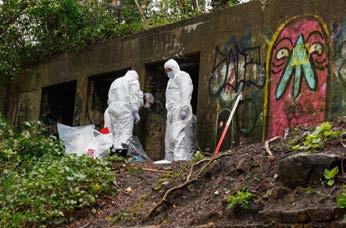
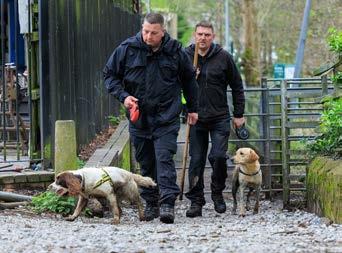
On Thursday 3 April GMP initiated the reshape of its IT function with the launch of the Information Technology Digital Directorate (ITDD) after an extensive period of detailed planning, preparatory discussions, and a broad recruitment campaign.
The directorate’s mission statement is as follows: ‘ITDD is committed to supporting GMP’s journey to outstanding by delivering a customer-centric service. We will deliver an environment that fosters performance, innovation, security and value for money.’
Director of IT and Digital ACO Dougie Henderson explains why this change has been a crucial step in enabling GMP to lay the foundations for future digital transformation.
What are the main goals of the recent ITDD restructure?
The new directorate has increased the capacity of the IT team, while drawing in the Digital Policing Programme, IMET and iOPS helpdesk, the internal digital forensic IT team, the device managed service and radio workshops. The team draws upon staff with many years of experience within GMP, and complements them with staff who bring a depth of IT experience from across both the public and private sector.
What prompted the decision to restructure at this time?
IT is ever more important to the delivery of policing. This new directorate is integral to the demands of policing now and in the future and builds upon the fantastic work that has been delivered by IT over the last two years, positioning us well for what will be an exciting and innovative future for GMP.
What opportunities for growth can we expect under the new structure? Are any new roles or departments being introduced?
We have created a structure which supports development opportunities from within the department and from across the forces. This is already apparent from the recent recruitment process where several promotions from within IT and from across the force took place. As we continue to embed new solutions, we will look at further opportunities to expand the service that we offer.
The reshaping of IT has given us a
renewed opportunity to place the right people in the right places, ensuring that the new ITDD is equipped to continue the transformation process in line with the refreshed Plan on a Page objectives and force priorities. One of the most significant introductions to the ITDD is the Digital Policing Programme, which has moved from Change branch. This team now encompasses the Centre of Excellence: a new collective focused on ensuring upcoming priority projects are structed, implemented and delivered in a lean, efficient and effective manner.
Our core business – of delivering IT services that supports GMP’s journey to outstanding – remains, and it is anticipated that changes to roles and responsibilities will enhance this.
What steps are being taken to uphold clear communication and support employees throughout this transition? The ITDD has taken comprehensive steps to ensure that all members, both from the previous and current structures, understand the necessity of these structural changes. Leaders are working collaboratively with the Corporate Communications branch to provide timely and transparent updates. Information resources, such as the ITDD intranet hub (Home > Branches > Information Technology and Digital Directorate), along with regular internal communications and online articles, ensure that the latest information about the branch is readily accessible. Leaders are committed to maintaining open fora through which everyone involved in the restructure can share their thoughts and concerns.
In addition to regular communications and feedback fora, leaders will continue to be available to offer support and answer any further questions about these changes. The ITDD’s all-hands approach emphasises that we are all in this together. Supporting and sharing with colleagues will be crucial to the overall success and positive internal sentiment as we navigate change and growth as a force. With our small team, collaboration is essential.
How can we stay informed about ongoing changes and share our feedback during this transition?
The ITDD hub will be your go-to for all the latest information and IT
news. Colleagues are encouraged to communicate any concerns with line managers in the first instance and share their thoughts with the SLT anonymously. Additionally, the ITDD have regular meetings where changes will be discussed.
What are the expected benefits of this restructure, in the short and long term?
By integrating IT services from across the force into a central function, the ITDD has been able to increase the number of staff members delivering critical IT services. This puts IT in a position to enhance the service we offer and to act as the springboard for future growth and development.
Are any new processes or systems being implemented as part of the restructure?
We have been implementing numerous changes and new systems over the past couple of years in preparation for the restructure. These changes range from handling helpdesk tickets to introducing a new front door for IT requests. The new structure now provides a firm foundation to embed and build upon the work we have already undertaken, enabling ITDD to further enhance the services we offer across GMP.
How will success be measured and communicated to the team?
We have developed a set of representative key performance indicators (KPIs) which are reported and monitored within ITDD team meetings, at SLT level and the organisational VCPF. The focus on KPIs will remain central to what we do; we will expand the KPIs as needed to reflect wider focus of the team, and we will of course continue to communicate them widely.
How does this new structure align with our long-term strategic objectives?
The new ITDD function is committed to supporting GMP’s journey to outstanding by delivering a customer-centric service. We will deliver an environment that fosters performance, innovation, security and value for money. This approach supports the wider Plan on a Page and force objectives, as almost all developments within the force have a significant IT component.

The impact of prescription medication on the illicit drug supply chain in the UK has increased dramatically over recent years, with a corresponding rise in the number of drug-related deaths.
GMP officers may be used to dealing with what are considered to be ‘typical’ Class A and B drugs like heroin, cocaine and cannabis – however, in recent years the use of these drugs in combination with prescription medications has increased, as has the illicit recreational use of prescription drugs in their own right. The supply of prescription medicines outside legitimate medical channels has become more and more lucrative, and as a result the supply chain has begun to draw the interest of organised crime groups.
Prescription medication can enter the illicit supply chain in a number of ways:
• Diverted: this refers to drugs which are ordered from legitimate suppliers to registered pharmacies or dispensers, but which are then diverted out of legitimate supply –sometimes by employees of these pharmacies or dispensers – and introduced into the illicit supply chain.
• Imported: various types of prescription medication can be imported from other countries whose restrictions of the supply of these types of medicines may be less stringent than that of the UK, meaning
that the medicines can be ordered online with minimal oversight.
• Counterfeit: sometimes prescription medications can be manufactured by non-legitimate suppliers, or other drugs can be passed off as some other drug of a higher monetary value.
Of these methods, diverted drugs represent the most common means by which prescription medication enters the illicit supply chain.
The role of a controlled drugs liaison officer (CDLO) is to ensure compliance with policy and procedure, ensuring that any agency involved in the dispensing of controlled drugs (such as pharmacies, hospitals, and care homes) report any issues that they identify. CDLOs use their powers under the Health Act to conduct inspections and identify risk issues, working closely with the General Pharmaceutical Council (GPhC), which provides professional accreditation for pharmacists, and the Medicines and Healthcare Regulatory Agency (MHRA), which is responsible for regulating the suppliers of controlled drugs; as well as other partners in the NHS.
The duties of a CDLO include carrying out unannounced visits to retail pharmacies to assess and advise on their tracking and storage of controlled drugs, as well as visiting premises where concerns around controlled drugs have been identified by colleagues or regulators. CDLOs may visit a wide
range of places where controlled drugs are provided, from NHS trusts and private hospitals to care homes and prisons. Many of their investigations are conducted in partnership with CDLOs from neighbouring forces around the North West.
While GMP’s three CDLOs are all former detectives with a great deal of experience, they are not police officers and cannot conduct criminal investigations or carry crimes. What they can do, however, is support officers carrying crimes by assisting in gathering evidence; explaining policy, procedures, and legislation; and liaising with partners, which can often result in the essential provision of expert evidence and fill existing evidential gaps.
Due to the increasing number of reported drug diversions, we are seeing an increase in reports of crimes of this type; and investigative responses can be limited for a number of reasons. There is a clear risk to life posed by the growing illicit trade in these medicines, and we need to respond to this risk.
The CDLOs offer a comprehensive knowledge of systems within pharmacy and general controlled drugs requirements in all settings and are happy to assist with any query.
How to reach the CDLOs
Michael Beard (66517): 07818 457518
Stefan Bidolak (66715): 07867 904906
William Graham (72976): 07720 242212
On Saturday 22 February, officers from GMP and the Code 9 men’s mental health support group took part in a men’s mental health ‘walk and talk’ event with officers from West Mercia Police’s men’s health team.
The team completed a nine-mile walk around the Tegg’s Nose Country Park area of Cheshire, finishing near Bollington, which overlooks the city of Manchester. Once again, they were able to take part in some interesting discussions about wellbeing and how each force is looking to progress things,
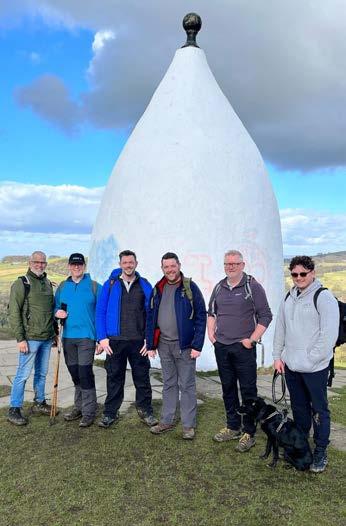
while taking in the views along the route. Spending time outdoors has been proven to reduce the risk of mental health problems developing and walking is one activity that people can engage in to improve both their physical and mental wellbeing.
The event was a great success and West Mercia officers are now looking to host GMP again, but they will also be inviting neighbouring forces to join in.
Sgt Stuart Charlesworth from the Code 9 support group said: “This was the second time we’ve met up with the team from West Mercia and we’re
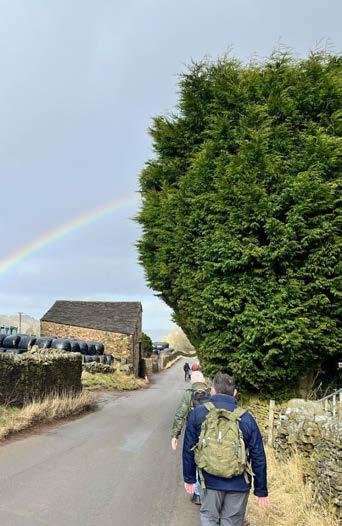
looking forward to meeting up again. The day was a great success and thankfully the weather held out for us. The walk had a few challenging inclines, but they were worth it for the views – and we finished in a local pub for a well-earned lunch! We’re now going to be inviting other forces to join us; going forward we want to make these walks a regular event, with two scheduled walks per year.”
If you’re interested in taking part in the next walk or would like further details, contact Stuart on 09351@gmp.police.uk or Tom Hall on 17202@gmp.police.uk.

GPM DC Jordan Wilcock has launched an initiative to support individuals struggling with mental health or loneliness by inviting them to local non-league football matches. Jordan, who works in crime training at Sedgley Park, has been running his social media pages on X for the past 18 months, sharing fixtures, results, and news about Greater Manchester teams. Inspired by a podcast about Head in the Game, an Irish mental health charity that uses sport to support people, he has now created the ‘Fellow Fan’ initiative, issuing open invitations to non-league
games for fans who are struggling with their mental health or feeling lonely.
Jordan explains: “I regularly attend non-league games and saw an opportunity to help football fans who might be struggling. By inviting them to a match, I hope to provide a reason for them to leave the house, enjoy some fresh air and have someone to talk to. This simple act could be very beneficial for their wellbeing.”
If you would like more information or want to get involved, please contact Jordan at 15196@gmp.police.uk or follow @GMNonLeague on X.

In March, GMP launched Operation Machinize: a three-week intensification period focusing on combatting criminal activity carried out by Organised Crime Groups (OCGs).
Op Machinize was launched by the National Crime Agency (NCA) with funding from the Home Office to deal with issues including Organised Immigration Crime (OIC), money laundering, drugs supply and the selling of illegal tobacco products and vapes.
Vulnerable people are often exploited through these types of criminality and the proceeds of crime are often used to fund further criminal activities.
Illegal vapes tend to contain either a nicotine strength level exceeding the two per cent legal limit, or they have a tank capacity exceeding the maximum 2ml limit, and may also contain illegal, potentially harmful chemicals.
Many of these vapes are marketed
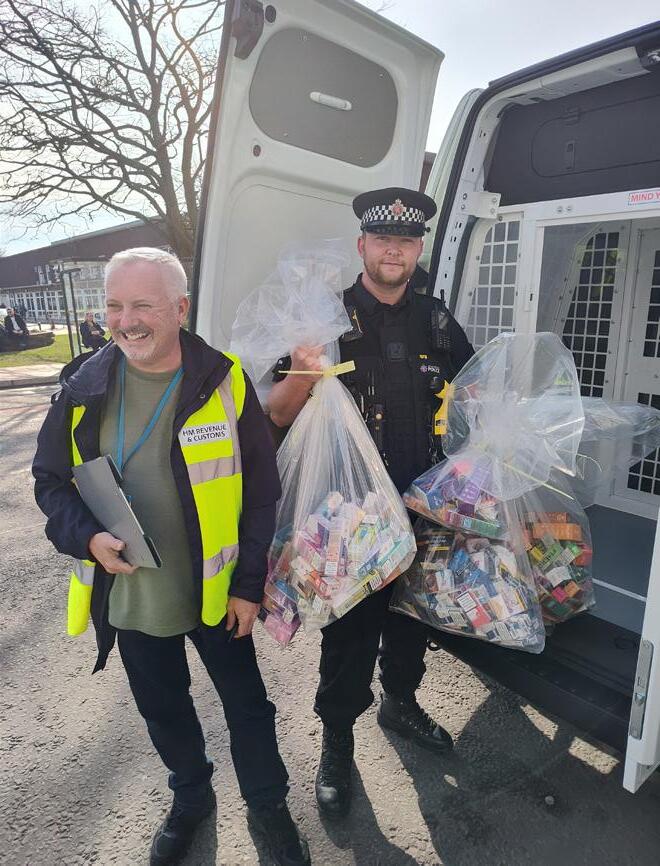
in brightly coloured packaging with delicious fruity and sweet flavours, which can be more attractive to children and young people.
Some of the food and drink products imported and being sold over the counter in the premises targeted did not comply with EU and UK food standards and could also put consumers at risk.
The intensification period took place between 3 – 21 March and saw national collaboration between law enforcement agencies with the aim to improve intelligence sharing and build a better understanding of the threat posed by this type of crime, whilst bringing together a variety of specialist capabilities and expertise to tackle the threat collectively.
The teams involved made use of both police and partnership powers to obtain access to search premises, review finances, review licences and stock amongst a variety of other activities.
Within Bury, two shops were

For your awareness supervisors are held to account at daily performance DMM. Focus for March / April Performance DMM continues to be locate – trace, bail, file escalations and crime outcomes.
Thank you for your patience with Bury Custody being closed and the roof work being completed. I am
sure you are all pleased to see that the work was completed in time and Bury Custody is now open.
The next stage of structural work is due to start in the next few weeks and you will be informed if this affects you.
The canteen roof terrace will be open soon as well.
Please make sure you get any
specifically targeted during one of the days of action which saw the below seized:
• 398 vapes
• 65 packets of cigarettes
• 17 packets of HRT (hand-rolling tobacco).
The combined value of seized items is estimated to be £5500 and this seizure means that officers are able to build more of an intelligence picture on businesses in the area.
Working collaboratively with partners also meant that they were able to follow up their own investigations with HMRC compiling packages for further compliance visits in the future and noting that they now have a ‘feel’ for the businesses and potentially criminality.
Trading Standards and licensing are also conducting further investigations and submitting relevant referrals to ensure communities are kept safe from products which may cause them harm.
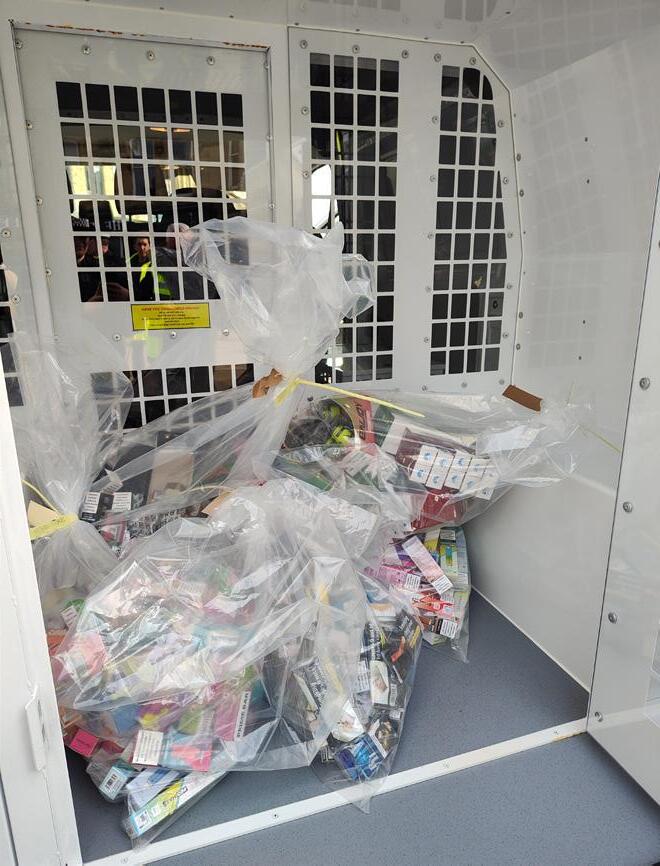
nominations in for the Best of Bury Awards on Friday 9 May!
To ensure you are up to date with CPD and safe to be deployed please ensure you are up to date with your PPST and First Aid and that you have completed all your mandatory NCALT packages. Any questions ask supervision.
We often forget about the good work that has happened across the district because we are constantly moving on to the next thing.
We wanted to use District Brief to ensure this good work is captured and we highlight those that have gone above and beyond not only for our communities.
Below is just a snapshot of the good work that happens every single day across Bury:
Harry Taylor and Sam Parkinson
From Sergeant Harper – “I just wanted to take a moment to acknowledge your unwavering work ethic. As I’ve been reviewing prisoners and incidents over the weekend, I’m never surprised by the level of dedication and thoroughness you bring to your work. Your commitment truly sets a standard for excellence and is an inspiration to everyone around you. Keep up the fantastic work.”
PC Logan Wiseman and PC Frankie Clayton
From Chief Inspector Sam Jackson: “I just wanted to say great work by Logan and Frankie after a male was found on a bridge. They engaged well with the male and persuaded him to come back over to the right side. Fire and ambulance were in attendance as this incident had the potential to be lengthy however thanks to the fantastic work of these two officers, the male was brought to safety.”
Thank you to the team behind Operation Machinize
From Sergeant Katie Grindrod: “Thank you to the town centre neighbourhood team, Sergeant Muca, Sergeant HartleyPickles, Sergeant Starbuck and Sergeant Doyle, CPIU (PC Riasat, DC Molloy & T/DC Wojciechowski), DIU (PC Smith, CV Molloy, PC irish and PC Bunce), Challenger (DS Murray & DC Deighton) and Partnership (PC Eccleston) for their assistance with Op Machinize.
“The visits were in partnership with Immigration, Trading Standards, Licensing and HMRC. All together 1,898 vapes, 65 packets of cigarettes, 17 packets of HRT and 4kg of Shisha Tobacco was seized with an approximate value of £21,400. One barbers shop was fined £60,000 for immigration offences.
“Overall, 16 new pieces of intelligence was created on businesses suspected of
hiding criminality behind closed doors of what appear to be genuine businesses. This was part of a national operation which the BBC came along to film and appeared on BBC News.”
“Brilliant Ramadan community reassurance”
From Tan Ahmed – Chief Executive of ADAB (Charity supporting people from minority backgrounds): “I am writing to thank you all for the brilliant Ramadan community reassurance cover in all the mosques and continued community engagement. In the last 12 months especially with the work we have done with Abed Hussain and some of your other colleagues we have seen greater engagement which has been noticed by all the BAME community especially the Muslim community.
“I believe your ‘Reassurance policing’ is taking shape and creating police’s positive image to the Muslim community, and on greater level the public is reassured by the police being visibly present within communities, and that they are accessible to share info, collect and engage.
“Once again a huge thank you to all our police force in Bury.”
“Nothing short of exceptional”
From T/Sergeant Sam Parkinson: “Currently the team are sitting at the lowest crimes collectively for a DIT in Force and are one of the Force’s overall top scorers for positive outcomes and charges. The work the team has put in since the DOM model to keep at an average of 20 crimes an officer with regular charges of prisoners is nothing short of exceptional under challenging circumstances.”
A response team and PC
From Sergeant Chris Redman: “I happened to come across a motorcycle vs wall RTC whilst travelling home from Claytonbrook, without any responders on scene at the time, so pulled over to lend a hand.
“I hadn’t been on scene long when several of your officers turned up to close the roads and facilitate a safe working space for myself and NWAS upon arrival. I just wanted to pass on a well done to the officers on scene. Everyone in attendance was keen to help, very polite
and dressed in hi-viz and hats from the start.
“This incident, for some, probably wasn’t even the most bizarre thing they dealt with that day, but from my point of view your team turned up with the right equipment, right attitude and in a timely manner without even knowing a sergeant would be there already. I personally live in Bury and its reassuring to know that the officers looking after my little corner of the world are working to a high standard.
“Please could my regards and thanks be passed on to those present, and make it known that their efforts to deliver an excellent service don’t go unnoticed.”
“Please extend my heartfelt gratitude”
From Councillor Khalid Hussain: I am writing to express my sincere appreciation for the exceptional leadership and service demonstrated by Inspector Abed Hussain during the Holy Month of Ramadan. His dedication and commitment to ensuring the safety and security of the Muslim community in Bury have been truly outstanding and deserve recognition.
“Inspector Hussain’s proactive approach in providing security to all the mosques during this significant period has been invaluable. His presence, engagement, and efforts in safeguarding worshippers have not only reassured the community but have also strengthened trust and confidence in the police. He has gone above and beyond in fostering a sense of safety and inclusivity, ensuring that those observing Ramadan could do so in peace and without fear.
“His leadership, professionalism, and genuine care for the community have not gone unnoticed. Many members of the Muslim community have spoken highly of his approachability, attentiveness, and willingness to listen to concerns. His work has had a lasting positive impact, and I strongly believe that such dedication should be recognised and celebrated.
“Please extend my heartfelt gratitude to Inspector Hussain and his team for their hard work and commitment. Their efforts have made a real difference, and I hope his contributions are acknowledged within the force.
“Thank you for your continued efforts in keeping our communities safe.”